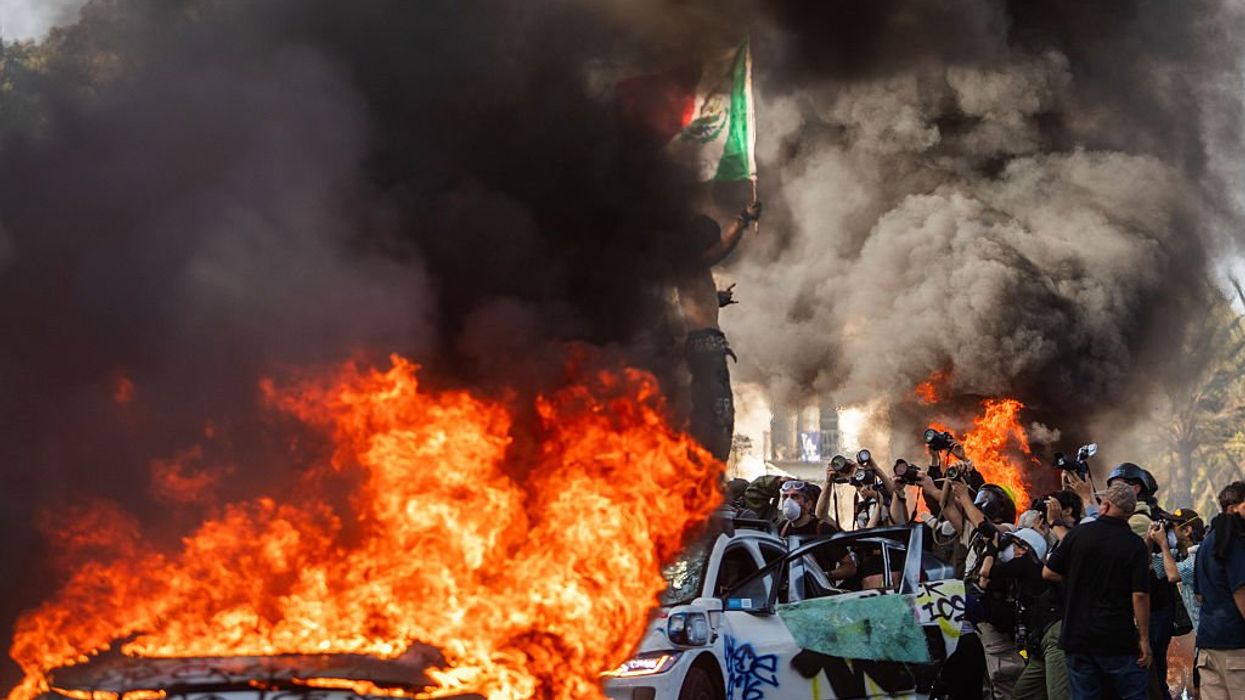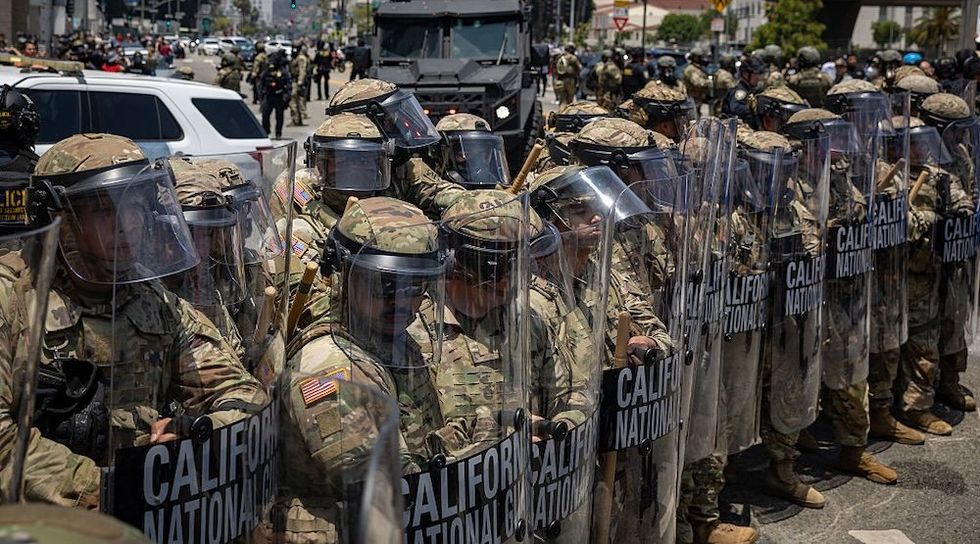
Photo by Apu Gomes/Getty Images

While critics cry ‘tyranny,’ the law and history are clear: Presidents may act when states won’t.
In response to widespread rioting and domestic disorder in Los Angeles, President Trump ordered the deployment of National Guard units. More than 700 U.S. Marines from the Air Ground Combat Center in Twentynine Palms were also mobilized on Monday to protect federal property around the city.
As expected, critics pounced. They claim Trump’s orders violate American tradition — calling them anti-constitutional, anti-federal, and an authoritarian misuse of executive power. They say Trump is turning the military into a domestic police force.
In moments like this, the republic must defend itself.
But that argument isn’t just wrong — it’s nonsense on stilts.
The U.S. Army Historical Center has published three comprehensive volumes documenting the repeated and lawful use of federal military forces in domestic affairs since the founding of the republic. From the Whiskey Rebellion to civil rights enforcement, history shows that federal troops have long been a constitutional backstop when local authorities fail to maintain order.
Certainly, the use of military forces within U.S. borders must be limited and considered carefully. But the Constitution explicitly grants this authority. Article IV, Section 4 states: “The United States shall guarantee to every state in this union a republican form of government, and shall protect each of them against invasion; and on application of the legislature, or of the executive (when the legislature cannot be convened), against domestic violence.”
That clause isn’t a suggestion — it’s a command. A republican government exists to safeguard life, liberty, and property. The First Amendment protects the right to peaceably assemble and petition the government, but it does not shield acts of arson, looting, or assault. When rioters threaten the public, federal intervention becomes not just permissible but, in this instance, necessary.
Article II empowers the president, as commander in chief of the Army, Navy, and National Guard (when called into federal service), to act decisively against both foreign and domestic threats. That includes quelling insurrections when state leaders fail to uphold public order.
The National Guard is not the “militia” the founders discussed. That distinction was settled with the passage of the Dick Act in 1903, which clarified the Guard’s federal identity in relation to state control. Since then, the Guard has operated under dual federal and state authority — with federal control taking precedence when activated. Once federalized, the National Guard becomes an extension of the U.S. military.
Congress codified this authority in 1807 with the Insurrection Act. It authorizes the president to use military force when ordinary judicial proceedings fail. This provision enabled presidents throughout history to deploy troops against domestic unrest. During the 1950s and ’60s, Dwight D. Eisenhower and John F. Kennedy used it to enforce desegregation orders in the South.
In 1992, President George H.W. Bush relied on the same statute to deploy Army and Marine forces alongside the California National Guard during the L.A. riots following the Rodney King trial verdict. That was done without sparking cries of dictatorship.
RELATED: Why Trump had to do what Gavin Newsom refused to do

Those accusing Trump of violating norms by acting over a governor’s objection should revisit 1957. After Arkansas Gov. Orval Faubus (D) defied federal orders to desegregate Little Rock Central High School, President Eisenhower federalized the Arkansas National Guard and sent in the 101st Airborne Division. Democratic Sen. Richard Russell of Georgia decried the move, comparing the troops to Hitler’s storm troopers — a reminder that hysterical analogies are nothing new.
Americans have sought to limit military involvement in domestic life. The Posse Comitatus Act of 1878 was designed to do just that — restrict the use of federal troops in civil law enforcement without explicit authorization. But even that law has historical nuance.
The concept of “posse comitatus” comes from English common law. It refers to the authority of sheriffs to summon local citizens to restore order. In early American history, federal troops often supported U.S. Marshals. They enforced the Fugitive Slave Act, stanched the bleeding in Kansas, and helped capture John Brown at Harpers Ferry.
After the Civil War, the Army played a key role in enforcing Reconstruction and suppressing the Ku Klux Klan under the Force Acts. Southern Democrats opposed this use of federal power. But by the 1870s, even Northern lawmakers grew uneasy when soldiers were ordered to suppress railroad strikes under direction of state and local officials.
The Army eventually welcomed Posse Comitatus. Being placed under local political control compromised military professionalism and exposed troops to partisan misuse. Officers feared that domestic policing would corrupt the armed forces.
I’ve long argued for restraint in using military power within U.S. borders. That principle still matters. But lawlessness, when left unchecked, can and will destroy republican government. And when local leaders fail to act — or worse, encourage disorder — the federal government must step in.
President Trump has both the constitutional and statutory authority to deploy troops in response to the violence unfolding in Los Angeles. Whether he should do so depends on prudence and necessity. But the idea that such action is unprecedented or somehow illegal has no basis in law or history.
If mayors and governors abdicate their duty, Washington must not. The defense of law-abiding citizens cannot hinge on the whims of ideologues or the cowardice of local officials. And in moments like this, the republic must defend itself.
Mackubin T. Owens